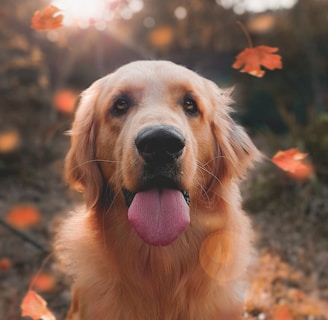Why Do Dogs Eat Bugs?
Understanding Your Pup's Bug-Eating Behavior
LIFESTYLE
Shay W.
10/26/20243 min read


If you’ve ever caught your dog munching on a bug, you might have wondered why on earth they’d want to do that. Bugs can be squirmy, crunchy, or downright creepy, but for many dogs, they’re irresistible! Today, we’re going to explore why dogs eat bugs, whether it’s safe, and what you can do if your dog’s bug-hunting habit gets out of hand.
Curiosity and Exploration
Dogs are naturally curious creatures, and they use their mouths to explore the world. When they see a bug crawling or flying around, their instinct is often to investigate it. Bugs are small, they move in unpredictable ways, and they make sounds that can be fascinating to dogs. All of these factors make bugs an interesting target for your pup, and often, they end up in your dog’s mouth simply because they’re curious about them.
Predatory Instincts
Dogs have an innate hunting instinct, passed down from their wild ancestors. This instinct is why you’ll sometimes see your dog chasing after small animals like birds or squirrels. Bugs, being much smaller and easier to catch, are perfect targets for dogs to practice their hunting skills. Even though your dog is fed well at home, this natural predatory behavior is still very much a part of who they are, and bugs are an easy way for them to satisfy this instinct.
Boredom and Entertainment
Another reason dogs eat bugs is simply out of boredom. If your dog isn’t getting enough mental or physical stimulation, they may start to entertain themselves by chasing bugs around the house or yard. For many dogs, catching bugs is a fun way to pass the time, especially if they don’t have other activities to keep them occupied. Providing plenty of toys, exercise, and mental enrichment can help reduce this behavior and keep your dog from eating bugs out of boredom.
Is It Safe for Dogs to Eat Bugs?
In most cases, eating the occasional bug isn’t harmful to dogs. Bugs like crickets or beetles are usually harmless and even provide a bit of protein! However, there are some insects that can pose risks. Bugs like bees, wasps, or spiders can bite or sting, causing pain or even allergic reactions. If your dog gets stung or bitten, you may notice swelling, redness, or discomfort. It’s always a good idea to monitor your dog after they eat a bug to make sure they aren’t having any negative reactions.
There’s also the risk of parasites or toxins. Certain bugs may carry parasites that can cause health issues for your dog. Additionally, if insects have come into contact with pesticides or other chemicals, ingesting them could be harmful. Always be mindful of pest control products used around your home and yard, and keep your dog away from treated areas until it’s safe.
How to Stop Your Dog from Eating Bugs
If your dog’s bug-eating habit becomes problematic, there are ways to reduce it. One effective method is to use positive redirection. If you see your dog going after a bug, try distracting them with a toy or a treat. Training your dog to respond to commands like “leave it” can also help prevent them from eating bugs. Providing plenty of exercise and mental stimulation is key—when your dog is properly engaged, they’re less likely to resort to hunting bugs for fun.
The Bottom Line
Dogs eat bugs for a variety of reasons, including curiosity, instinct, and boredom. While it’s generally harmless, there are some risks involved, so it’s important to keep an eye on your dog and make sure they aren’t eating anything that could be dangerous. If you’re ever unsure about whether a bug is safe for your dog, or if your dog shows any signs of illness after eating a bug, it’s always best to consult your veterinarian.
Thanks for reading! Understanding why dogs do the quirky things they do helps us be better pet parents. If your pup has a bug-eating habit, remember it’s usually nothing to worry about—but a little bit of redirection and training can go a long way in keeping them safe and healthy.
S.W.
